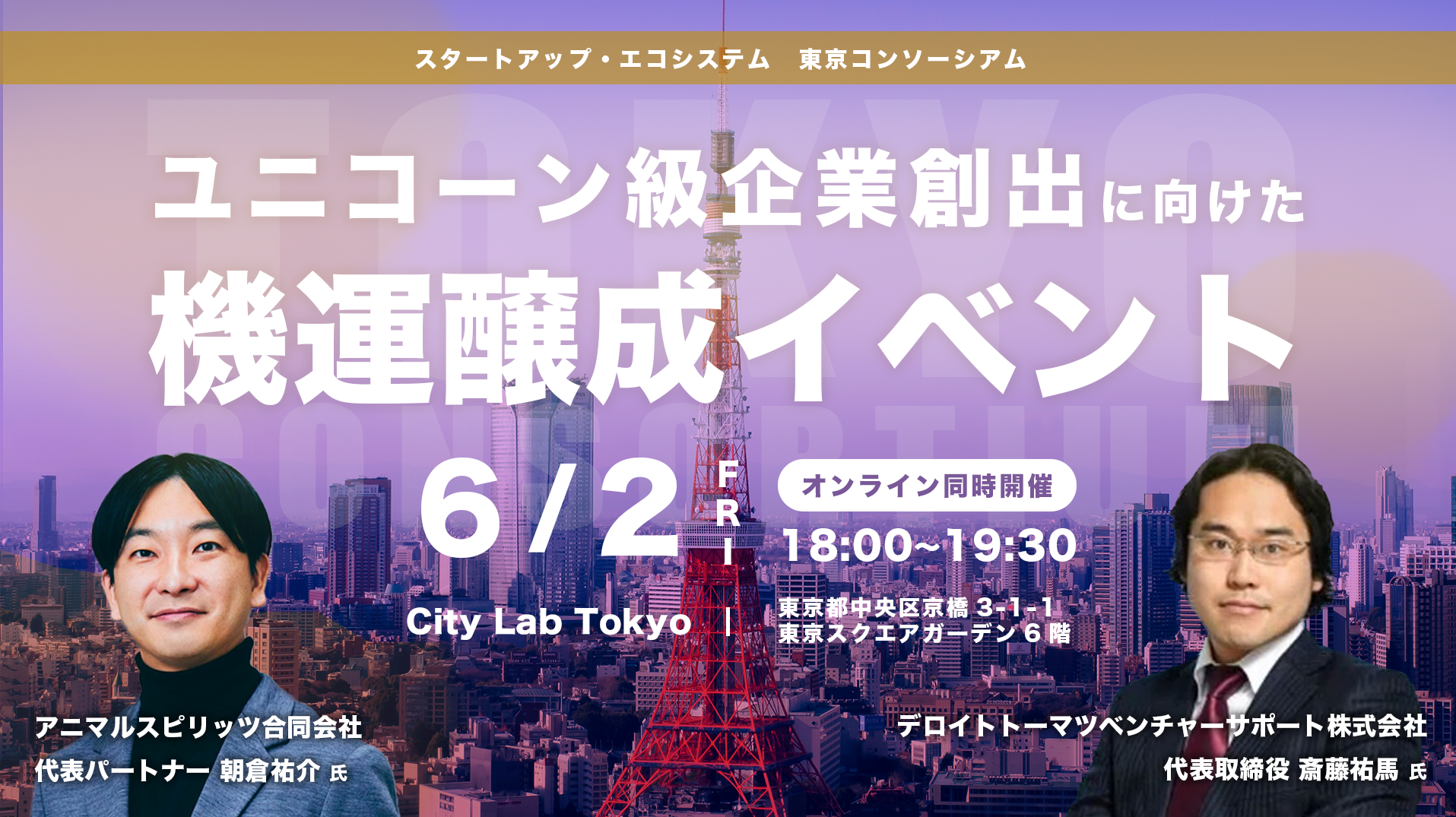


Startup Ecosystem Tokyo Consortium held the "Event to Create Momentum for Creating Unicorn-Class Companies" at Tokyo Square Garden on Friday, June 2023, 6. On the day of the event, Yusuke Asakura, representative partner of Animal Spirits LLC, took the stage and had a special discussion with Yuma Saito, representative director of Deloitte Tohmatsu Venture Support Co., Ltd. Afterwards, a question and answer session was held for both of them, and at the end, a social gathering was held for the participants.
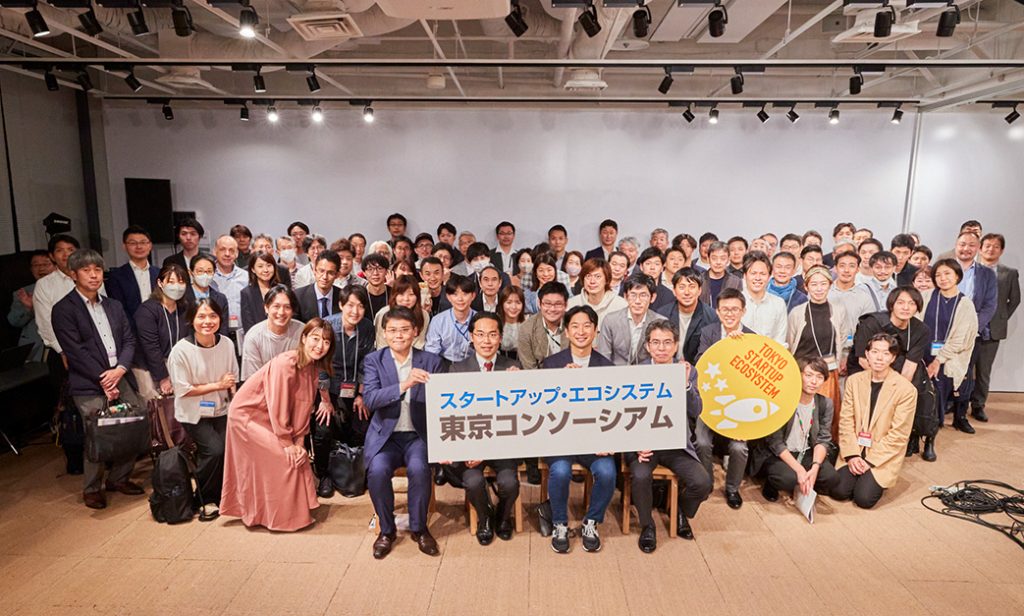
To open the event, Manabu Miyasaka, Chairman of the Tokyo Consortium and Deputy Governor of Tokyo, sent a video message to the participants gathered at the venue and those watching the live broadcast. He talked about his thoughts on startup support, including how startups are important players in creating future employment, and how a specialized team will support the construction of strategies such as globalization and financing in order for startups to grow into unicorn-level companies. I did.
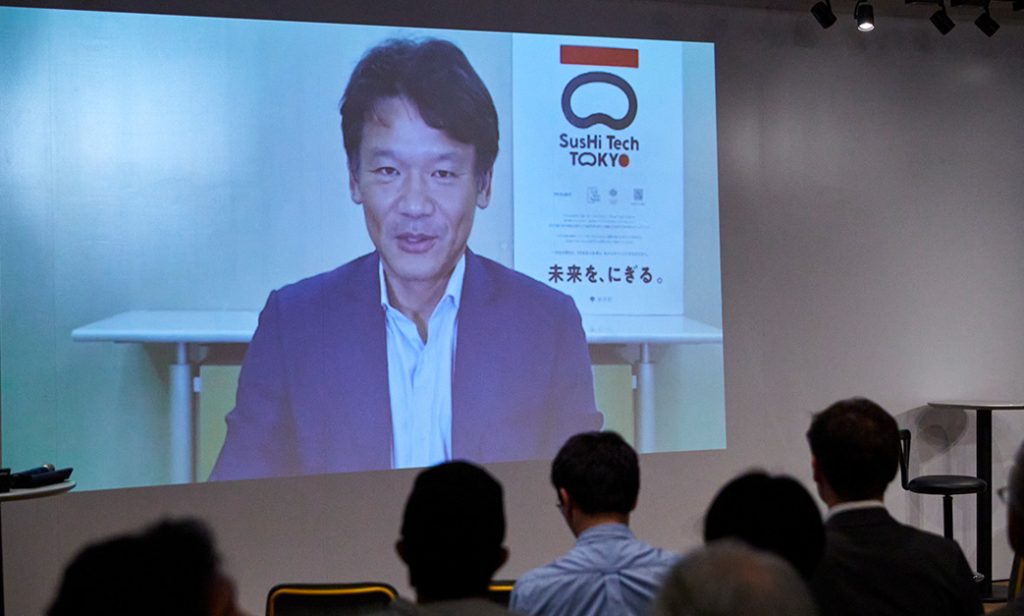
Next, Keiichi Yoshimura, Director of Tokyo Startup and International Financial City Strategy Office, explained Tokyo's startup strategy.
The Tokyo Metropolitan Government has a vision to increase the number of unicorns originating from Tokyo that are expanding globally, the number of startups in Tokyo, and the number of collaborative practices in Tokyo tenfold in five years. In order to achieve this, there are "four pillars": (5) Make Tokyo the most startup-friendly city in the world; (10) Create an environment where everyone can fly towards their dreams; (4) Provide strong support from all stakeholders as one team; (XNUMX) World We are conducting various initiatives centered on strategic communication with a view to the future.
Starting with the ``Tokyo Innovation Base'' initiative, which aims to bring together various organizations related to startups from Japan and overseas and build a large base to provide focused support, we are building a framework for providing funding to startups in their initial stages, and are expanding our global We introduced some of our startup support initiatives, including new mechanisms to support market challenges.
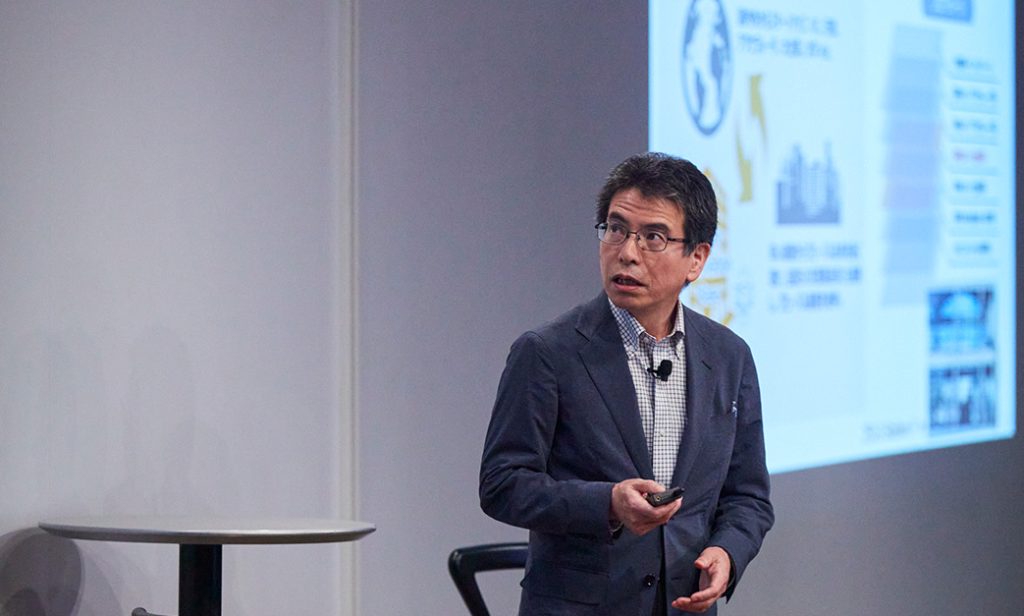
Yosuke Morimoto from the Tokyo Consortium Secretariat provided information about deep ecosystems.
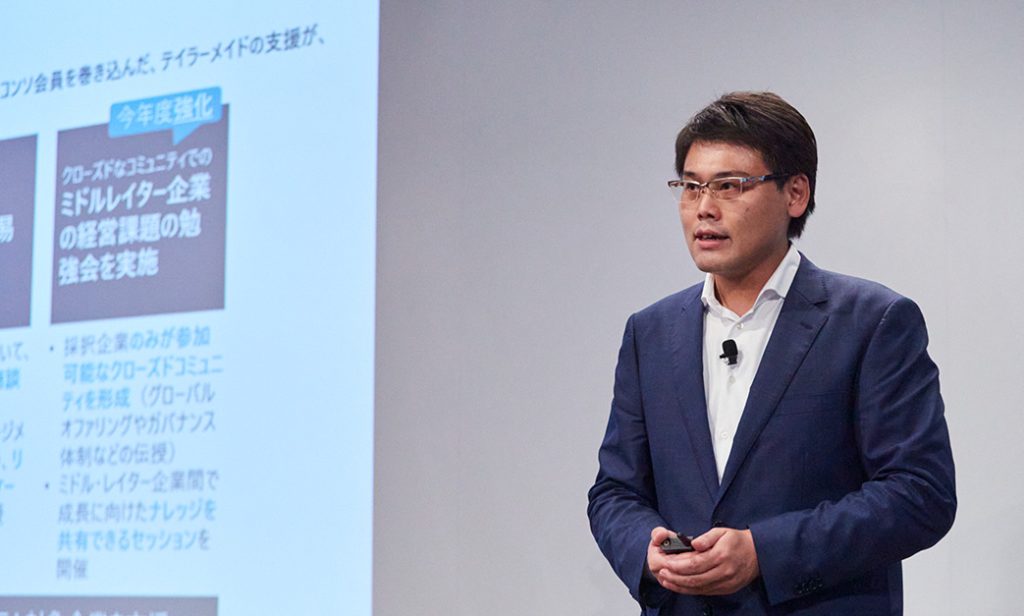
We welcomed Mr. Asakura as a special guest and had a conversation with Saito, who served as the moderator. First, Mr. Asakura gave a brief self-introduction, and we asked Mr. Asakura to look back on his path to the present day, where he invests in startups using his experience in managing startups and listed companies. Next, we talked about the main topic of startups. Below is an excerpt and summary.
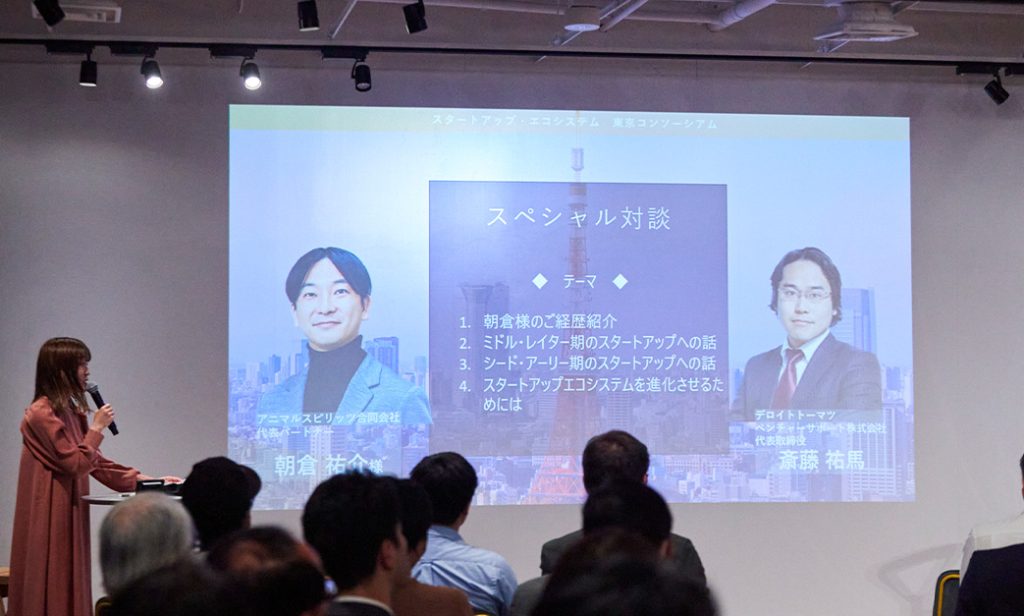
ミドル・レイター期のスタートアップについて
(I.e.:What is your understanding of the current environment surrounding mid-to-late startups?
Mr. Asakura(Hereinafter, titles omitted): Up until 2021, investment in startups was active, and overseas there were cases where the multiple (*1) of companies in the SaaS sector was 20 times, but in 2022, the U.S. Since the start of interest rate hikes, the investment environment surrounding startups has become tougher. Even for Uzabase, a listed company, the PSR (*2) remained at around 1x during MBO, an event that symbolizes the harsh environment. It is not possible to measure Japanese SaaS at the same level as overseas SaaS competing in the global market, but the reality is that Japanese companies are being looked at with some harsh scrutiny.
*1 One of the methods to measure the value of a company. Corporate value is calculated by multiplying management indicators such as assets, profits, and cash by an appropriate multiple.
*2 Stock price sales multiple. Calculated by dividing market capitalization by annual sales.
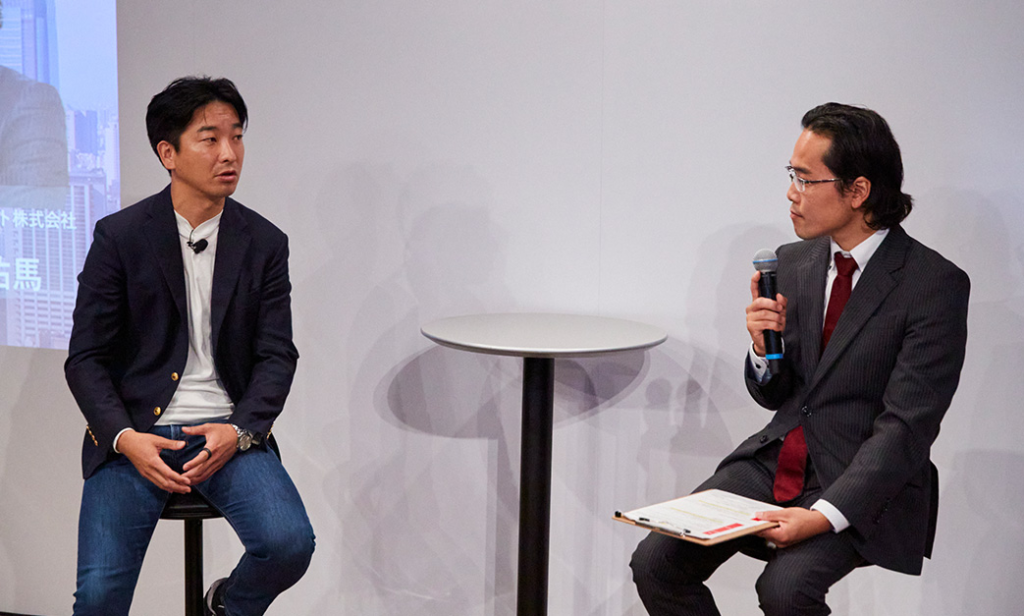
(I.e.:What do you focus on when investing in the middle and later years?
Asakura: From an investor's perspective, we focus on whether a business has intrinsic value and whether it can generate solid cash flow. In addition, companies in the middle and later stages not only look at the qualifications of their managers and management teams, but also look at things they have accumulated over time, such as balance sheets and side letters.
(I.e.: Mr. Asakura, you are also an experienced manager, but from a manager's perspective, what kind of exit strategy do you think is best? For example, if you decide to go public, do you want to wait until market conditions improve a little? Or do you want to join a large company?
Asakura: When considering an IPO as the main focus, the timing of an IPO will depend on each individual situation as there are aspects that the company cannot control, but once a certain amount of time has passed since the initial funding, existing investors will ask for an early exit. The pressure to do so is increasing. If you get carried away by this, you will not be able to list your business at the optimal timing, so you will need to proactively replace shareholders and lead proactively, and whether or not your management team is able to do that will determine what happens next. It greatly influences the potential for growth.
Additionally, an IPO is a major milestone for working employees, and incentives such as stock options are attractive. However, if the preparation period for listing is too long, the team often loses its enthusiasm, and there are many cases where the management team can't stand it and ends up listing the company. However, what is important is whether the timing is right for the business, and management must firmly face the essence.
(I.e.: What is the difference between companies that reach the “goal of being listed” and companies that continue to grow after that?
Asakura:Japan is characterized by the fact that it is easy to list even small companies, but institutional investors who invest from a medium- to long-term perspective are reluctant to take on you. Therefore, the main shareholder group will be individual investors. As a general trend, individual investors acquire stocks to take advantage of stock price volatility, but if you are dealing with them, your focus will shift from the perspective of growing the company over the medium to long term. As a result, I think many companies end up falling short of the “listing goal.” In order to avoid this, it is better to grow your company from an unlisted stage and list it in a big way, so that you can receive investment from institutional investors with a medium- to long-term perspective. However, there are few domestic funds in Japan that invest in late-stage companies, and the company is forced to rely on overseas "tourist money," so it remains to be seen how to increase the number of funds that continue to invest in unlisted Japanese companies. This is the challenge.
(I.e.:There are many people working at large companies today. What do you want from a large company?
Asakura:This may offend you, but there are three things that startups look for in large companies. Money, money, money. Examples include money for raising funds, becoming a customer and using the business, and providing funds when jointly developing a business. What often happens is that it takes time to make decisions rather than intervene in the business. The same screening criteria as those used when starting a business within a large company are applied, so it takes a long time to wait. For a startup, waiting a month is a death sentence.
When large companies partner with startups, I think it's best to create a "sandbox" for software development. This is a function that does not affect the main unit even if a problem occurs. Within a certain range, it is necessary to have an iron heart and not get involved at all and leave it to the startup.
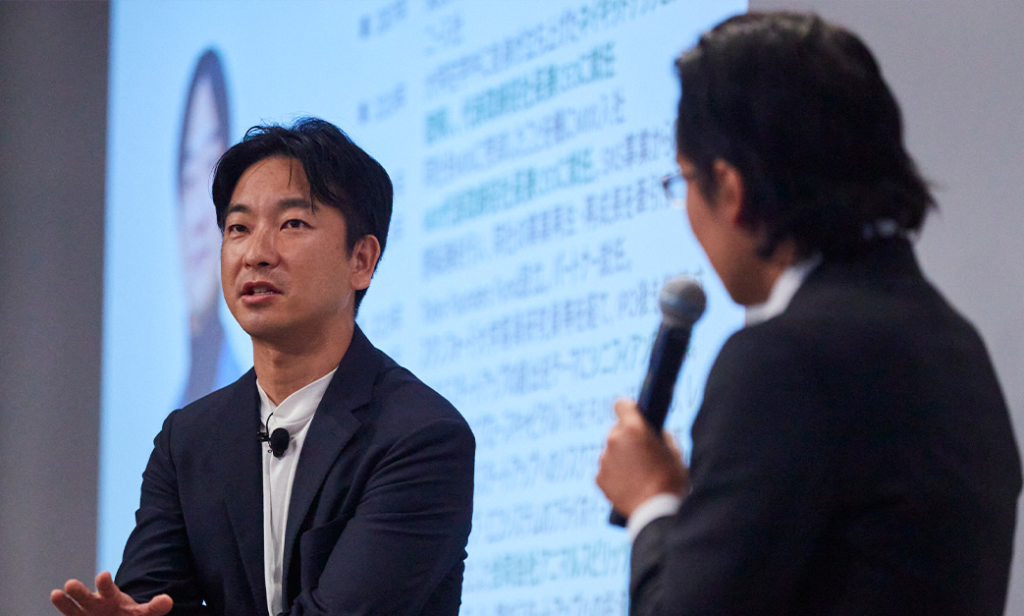
シード・アーリー期のスタートアップについて
(I.e.:What do you pay attention to when investing in seed/early stage startups?
Asakura:Currently, at a company called Animal Spirits, we are investing in seed and early stage companies with the vision of ``realizing social change for future generations.'' Specifically, we are a startup that is developing business in the following three areas.
The first is "protecting the country." Japan has now reached the end of its aging society and has entered a "super-aging society." In order to make Japan sustainable, for example, the DX sector applies. The second is "preserving the earth." These areas include climate tech (*3) and other areas such as decarbonization and circular economy. And the third is "Frontier". This is a new field such as generative AI and space exploration. When I meet with startups, I look at which of these three themes they fit into.
*3 Innovative technology to solve climate change issues
(I.e.:What is the difference between companies in the seed/early stage that grow and those that do not?
Asakura: Management and the market. There is no greater source of competitiveness than management, and no matter how hard you try in the wrong market, it will never work. I don't care about the quality of the product.
(I.e.: How large is the market?
Asakura: We don't think about scale. Even if SAM (*4) is small, if you can create a product that really sticks, you can expand horizontally. We also look at whether they have a firm perspective on how the market they are competing in will change in three, five, and 3 years.
*4 Maximum market size that can be obtained (achieved) by the business
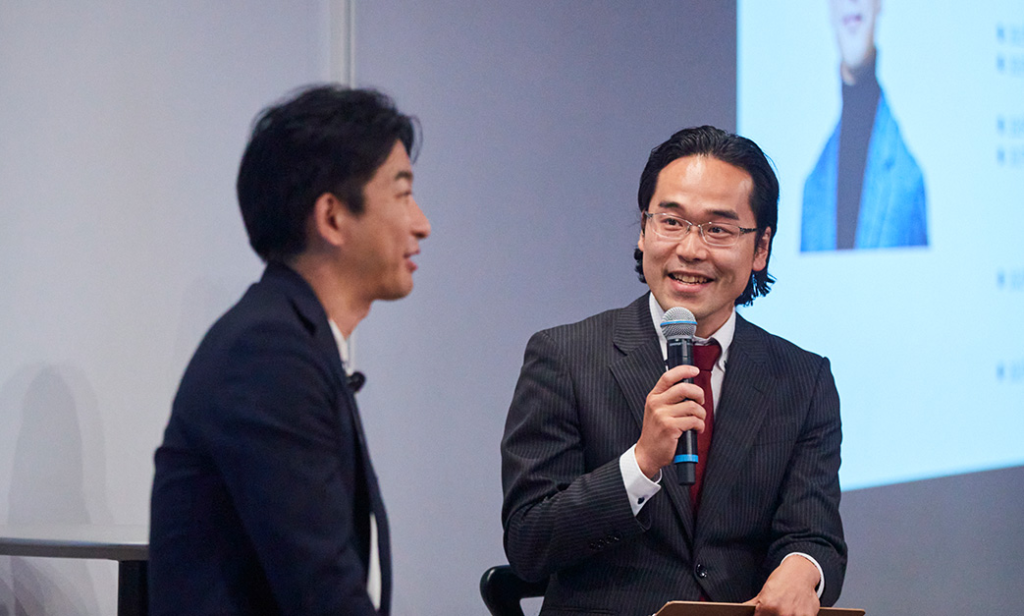
スタートアップ・エコシステムを進化させるためには
(I.e.: Director Yoshimura mentioned at the beginning that the number of unicorns originating from Tokyo that are expanding globally, the number of start-ups in Tokyo, and the number of collaborative practices in Tokyo will be increased by 5 times in five years. What do you think is necessary to make this five-year plan a success?
Asakura: After thinking about how to develop the startup ecosystem in my own way, I came to the conclusion that "animal spirits" are the most important thing. Animal spirits is a word coined by the economist Keynes that includes impulse, ambition, and drive. In short, the most important thing is what you want to do and what you want to create. Even though it is not a commissioned work and no one has asked you to do it, you take the initiative to accomplish what you need to accomplish. I believe that these impulses and thoughts are the most valuable at this moment.
(I.e.: What is important to acquire animal spirits to develop the ecosystem?
Asakura: Education. In Japanese education, there is a tendency to believe that it is okay to do the same as others, and that failure is not tolerated. There is a need to arrive at the correct answer as quickly as possible, but there is no correct answer in a startup. ``Total acceptance of being different from others,'' ``active encouragement of failure,'' and ``thinking for oneself'' are necessary in Japanese education. What I feel is the worst part is the ``move on'' that we are forced to do during the nine years of compulsory education. It's like being told to do the same thing as the person before you. There's no way someone who has been bombarded with such words for nine years will suddenly be able to create innovative things as an adult.
(I.e.:Finally, do you have any suggestions regarding government policy?
Asakura:I'm not in a position to comment on individual measures, but even if there is a large budget for measures to support startups such as the 5-year startup plan, I think that very few startups are directly benefiting. Masu. Of course, I think they are benefiting indirectly, and such measures are necessary, but I think it is necessary to make sure that startups can reap the benefits.
(I.e.:Finally, Mr. Asakura, please give a message to everyone at the venue and those watching the live broadcast.
Asakura: Never before has there been an environment where startups are so well-prepared. Don't tell Shinogo, let's do it. It is said that it is not a good thing that Japan has a tendency of not being able to recover if it fails, but this is wrong. It is much better to have experience in starting a business (even if you fail). Even if something doesn't have substance in nature, if you keep saying it, it will take on substance, so the phrase ``If you fail, you can't try again'' should be a taboo phrase.
Taking risks as a manager also means creating a way out. Create a system in advance so that you can restart even if you fail. Don't cut off your way out. Provide plenty of escape routes. I think it's important to create an escape route and take the plunge.
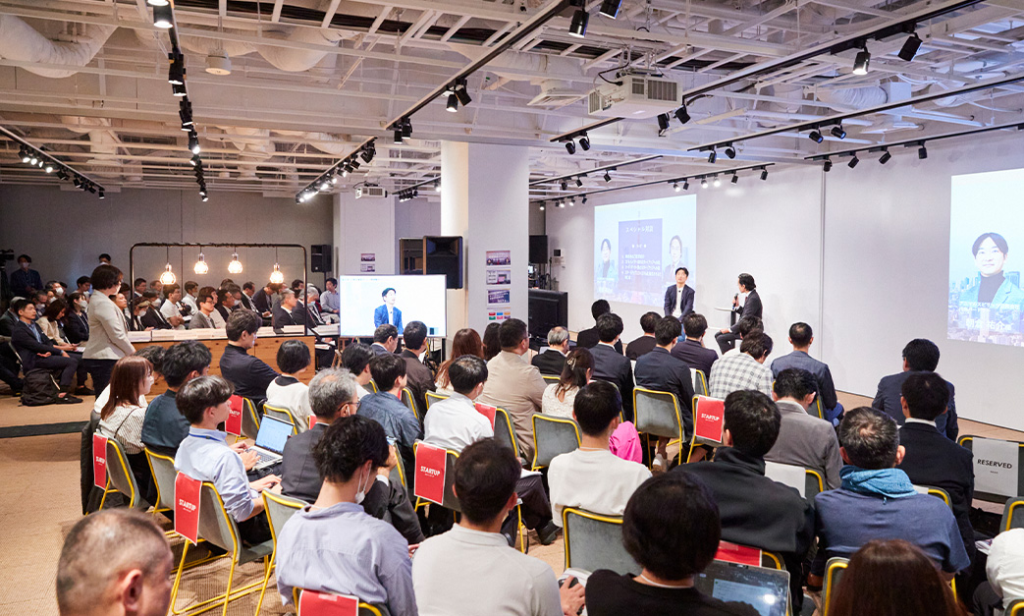
Finally, Shinya Asamitsu, Director of Startup Strategy Promotion, Strategy Promotion Department, Startup and International Financial City Strategy Office, Tokyo Metropolitan Government, gave a speech. In order to produce unicorn-class companies from the Tokyo Consortium, we once again promoted our participation in the "Deep Ecosystem" to the startups in attendance. Tokyo Consortium is looking for companies to support Deep Ecosystem. You can apply from the site below, so please feel free to participate.
Recruitment of companies eligible for “Deep Ecosystem” support in 2023 begins (tokyo.lg.jp)
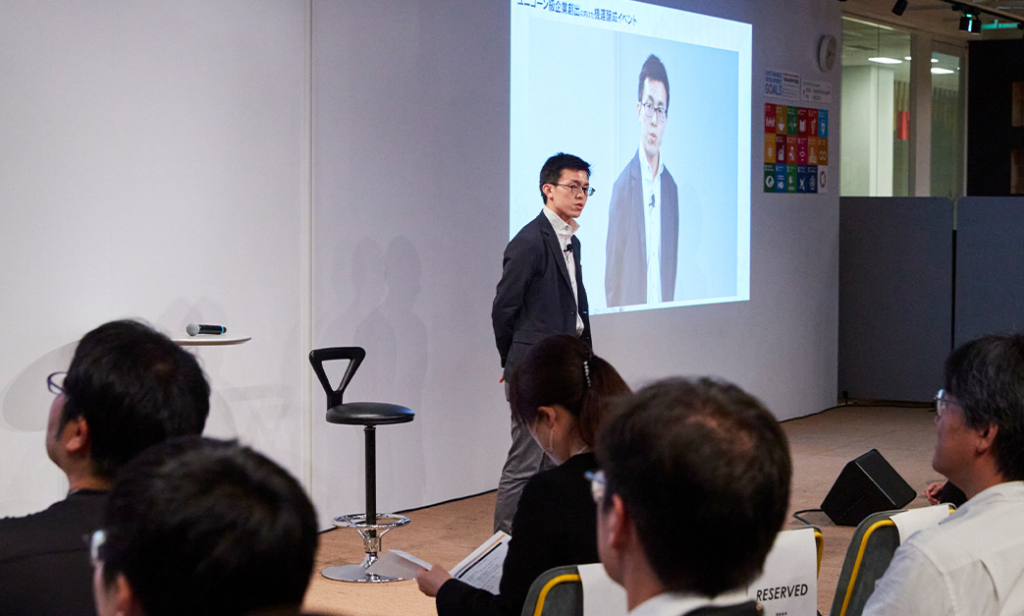
A social gathering was held for all the participants. At the venue, non-alcoholic craft beer produced by the startup was served free of charge. In addition, so that participants' attributes can be seen at a glance, the design of the special mount on the neck strap is divided into "startup," "business company," "investor/financial institution," "municipal government/university," and "media." Various measures were taken to encourage interaction between participants, such as writing ``people you want to meet today'' and posting them on panels, and the event was a great success with participants continuing to interact with each other until the end of the event. The meeting has now closed.
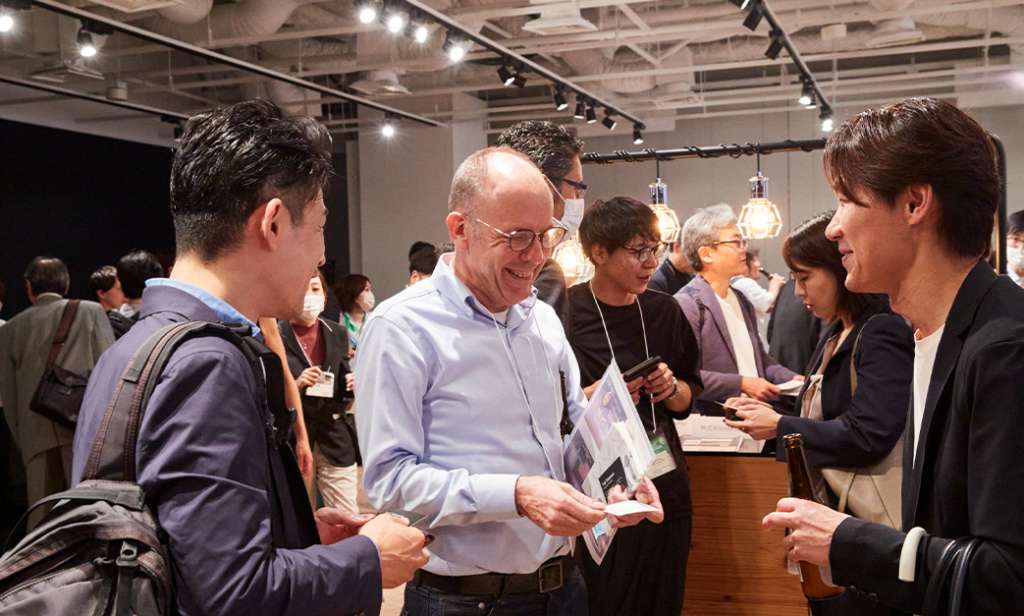
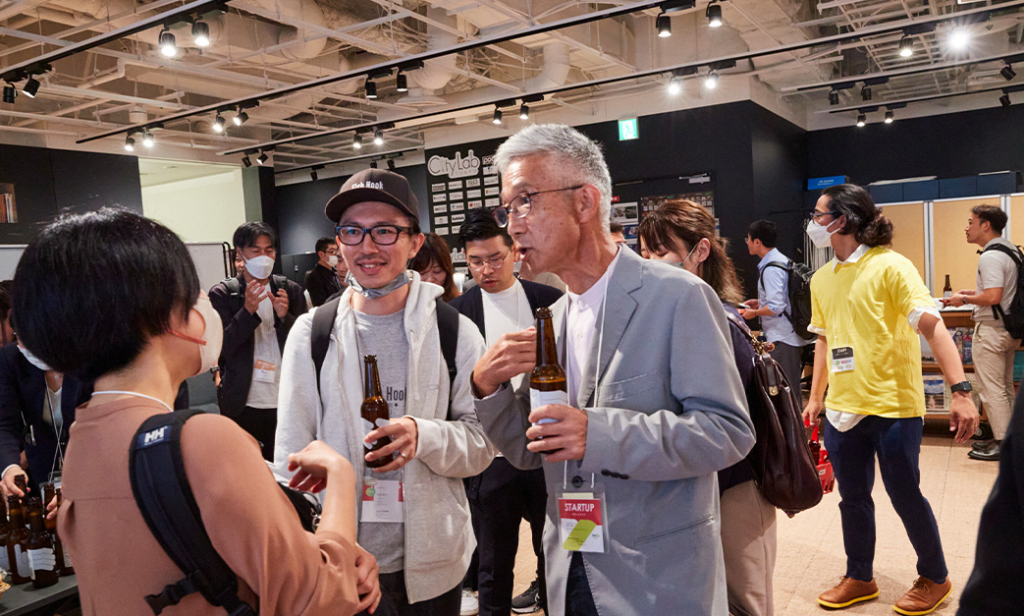
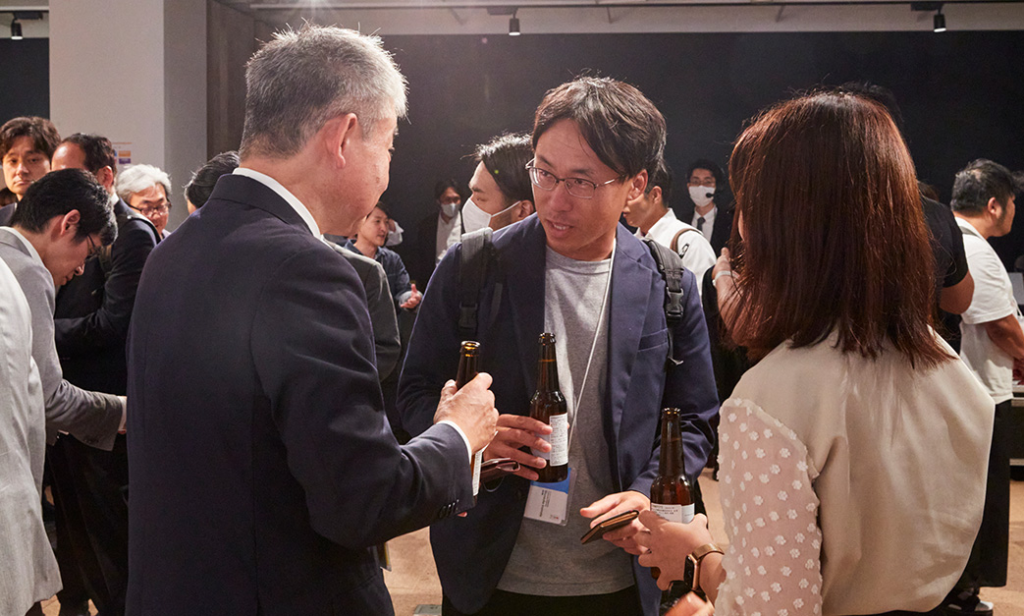
"Money is really important when you're running a startup. I think what Mr. Asakura said, 'What startups want from large companies is money, money, money,' is really true. Large companies are more cooperative. I would be happy if you could become one.”
“I really resonated with the words, ``Create an escape route and take the plunge.'' I myself turned down an escape route and jumped into a startup, but I thought I'd like to take a more relaxed approach.''
“The advice on creating a good sandbox was very helpful.”
“I could feel the enthusiasm in the venue and the idea that everyone, including Tokyo, was working together to make it even more exciting.”
“I felt the enthusiasm for the public and private sectors to work together to invigorate startups.”
“During the coronavirus pandemic, it was difficult to have this kind of interaction, but today I met new people and I’m glad I took part.”
Above